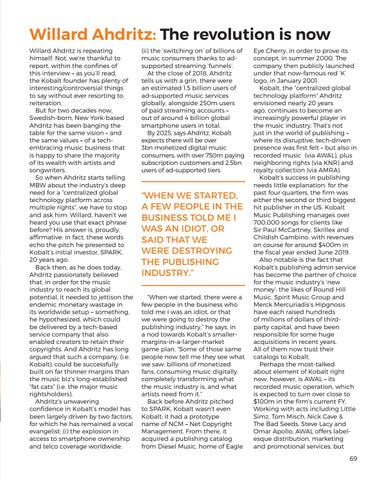Willard Ahdritz: The revolution is now Willard Ahdritz is repeating himself. Not, we’re thankful to report, within the confines of this interview – as you’ll read, the Kobalt founder has plenty of interesting/controversial things to say without ever resorting to reiteration. But for two decades now, Swedish-born, New York-based Ahdritz has been banging the table for the same vision – and the same values – of a techembracing music business that is happy to share the majority of its wealth with artists and songwriters. So when Ahdritz starts telling MBW about the industry’s deep need for a “centralized global technology platform across multiple rights”, we have to stop and ask him: Willard, haven’t we heard you use that exact phrase before? His answer is, proudly, affirmative: in fact, these words echo the pitch he presented to Kobalt’s initial investor, SPARK, 20 years ago. Back then, as he does today, Ahdritz passionately believed that, in order for the music industry to reach its global potential, it needed to jettison the endemic monetary wastage in its worldwide setup – something, he hypothesized, which could be delivered by a tech-based service company that also enabled creators to retain their copyrights. And Ahdritz has long argued that such a company, (i.e. Kobalt), could be successfully built on far thinner margins than the music biz’s long-established “fat cats” (i.e. the major music rightsholders). Ahdritz’s unwavering confidence in Kobalt’s model has been largely driven by two factors, for which he has remained a vocal evangelist: (i) the explosion in access to smartphone ownership and telco coverage worldwide;
(ii) the ‘switching on’ of billions of music consumers thanks to adsupported streaming ‘funnels’. At the close of 2018, Ahdritz tells us with a grin, there were an estimated 1.5 billion users of ad-supported music services globally, alongside 250m users of paid streaming accounts – out of around 4 billion global smartphone users in total. By 2025, says Ahdritz, Kobalt expects there will be over 3bn monetized digital music consumers, with over 750m paying subscription customers and 2.5bn users of ad-supported tiers.
“WHEN WE STARTED, A FEW PEOPLE IN THE BUSINESS TOLD ME I WAS AN IDIOT, OR SAID THAT WE WERE DESTROYING THE PUBLISHING INDUSTRY.” “When we started, there were a few people in the business who told me I was an idiot, or that we were going to destroy the publishing industry,” he says, in a nod towards Kobalt’s smallermargins-in-a-larger-market game plan. “Some of those same people now tell me they see what we saw: billions of monetized fans, consuming music digitally, completely transforming what the music industry is, and what artists need from it.” Back before Ahdritz pitched to SPARK, Kobalt wasn’t even Kobalt; it had a prototype name of NCM – Net Copyright Management. From there, it acquired a publishing catalog from Diesel Music, home of Eagle
Eye Cherry, in order to prove its concept, in summer 2000. The company then publicly launched under that now-famous red ‘K’ logo, in January 2001. Kobalt, the “centralized global technology platform” Ahdritz envisioned nearly 20 years ago, continues to become an increasingly powerful player in the music industry. That’s not just in the world of publishing – where its disruptive, tech-driven presence was first felt – but also in recorded music (via AWAL), plus neighboring rights (via KNR) and royalty collection (via AMRA). Kobalt’s success in publishing needs little explanation: for the past four quarters, the firm was either the second or third biggest hit publisher in the US. Kobalt Music Publishing manages over 700,000 songs for clients like Sir Paul McCartney, Skrillex and Childish Gambino, with revenues on course for around $400m in the fiscal year ended June 2019. Also notable is the fact that Kobalt’s publishing admin service has become the partner of choice for the music industry’s ‘new money’: the likes of Round Hill Music, Spirit Music Group and Merck Mercuriadis’s Hipgnosis have each raised hundreds of millions of dollars of thirdparty capital, and have been responsible for some huge acquisitions in recent years. All of them now trust their catalogs to Kobalt. Perhaps the most-talked about element of Kobalt right now, however, is AWAL – its recorded music operation, which is expected to turn over close to $100m in the firm’s current FY. Working with acts including Little Simz, Tom Misch, Nick Cave & The Bad Seeds, Steve Lacy and Omar Apollo, AWAL offers labelesque distribution, marketing and promotional services, but 69
